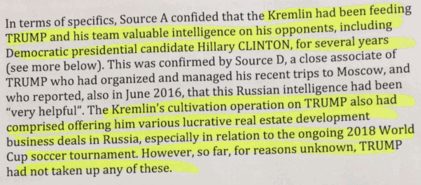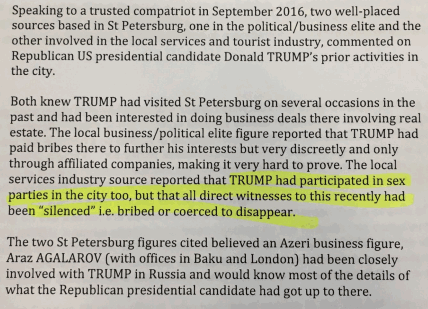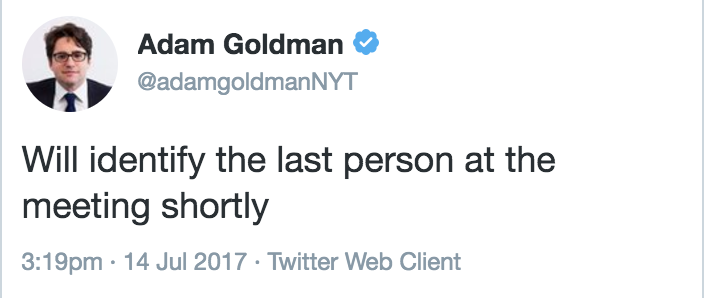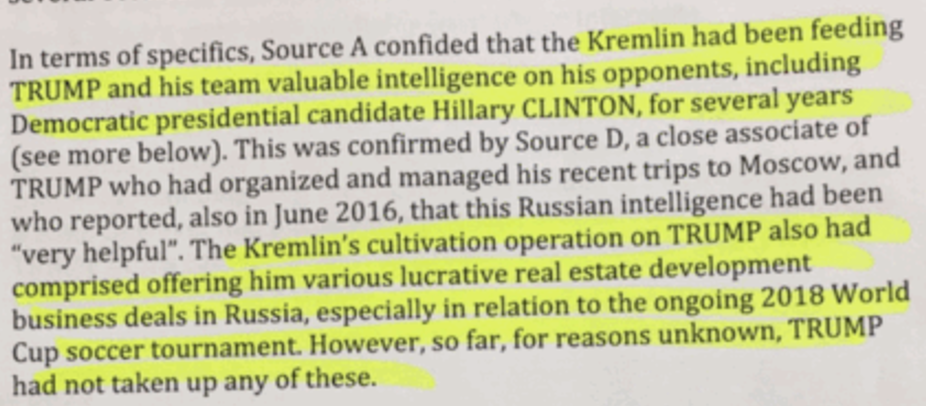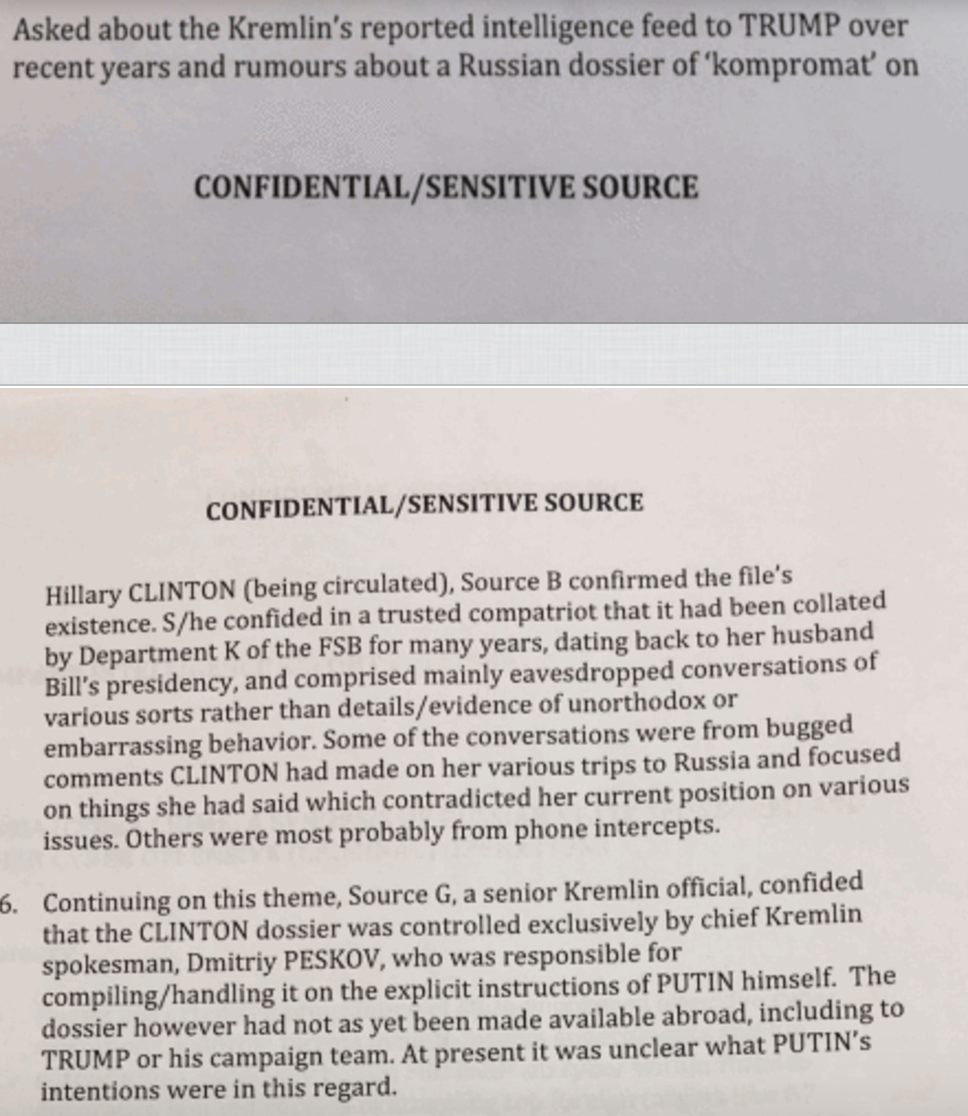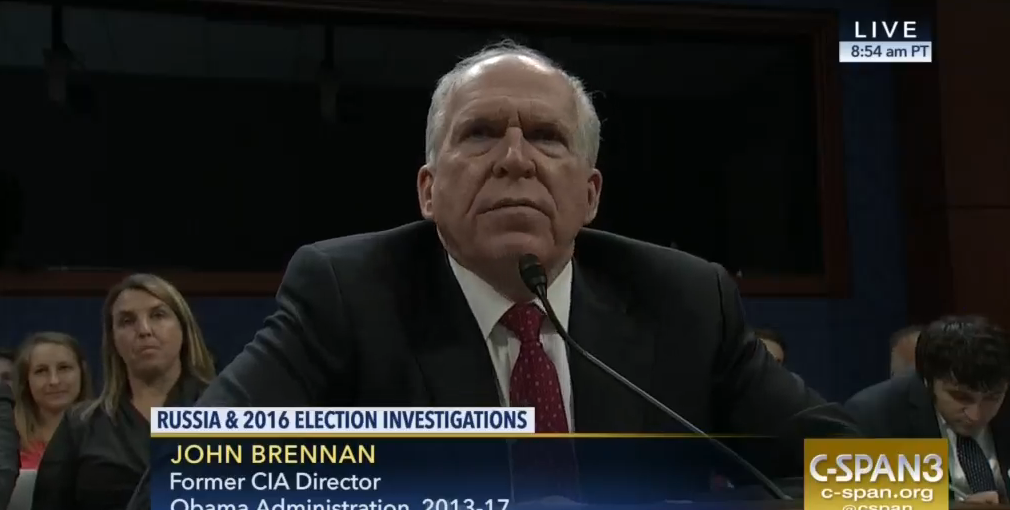In a response to Alexsej Gubarev’s British libel lawsuit, Christopher Steele has submitted a defense making certain claims about the dossier on Trump he reportedly did for Trump’s opponents. (Washington Times published the filing along with this story.) The defense provides some limited information on the dossier, while remaining entirely silent about known details.
The defense provides further explanation of how Steele came to share the dossier with John McCain. Sir Andrew Wood is an Associate of Steele’s firm, which is how he knew about the dossier. At an undated meeting between Wood and John McCain and his associate David Kramer, Wood told the Americans about the dossier. That piqued McCain’s interest, so Kramer met with Steele in Surrey on November 28. After Kramer returned to DC, he arranged to get a hard copy of the dossier for McCain, and requested that “any further intelligence gathered by the Defendants about alleged Russian interference in the US Presidential election” be provided to him on behalf of McCain.
Steele denies he shared the dossier with journalists
Of critical importance, to substantiate a claim that he wasn’t spreading the document all over creation, Steele states,
The Defendants did not, however, provide any of the pre-election memoranda to media organizations or journalists. Nor did they authorize anyone to do so. Nor did they provide the confidential December memorandum to media organizations or journalists. Nor did they authorize anyone to do so.
[snip]
[Steele] gave off the record briefings to a small number of journalists about the pre-election memoranda in late summer/autumn 2016.
I find the claim rather suspicious.
The changing (BBC) story about how it got (shown) the Steele dossier
Steele’s claim that he wasn’t sharing the dossier itself is dubious for several reasons. For example, the defense makes no mention of Steele sharing the dossier with the FBI, in spite of multiple reports of him doing so.
More damning, one of the reporters with whom the dossier was shared before the election, BBC’s Paul Wood, has changed a published story about receiving the dossier on two occasions. The original story appeared like this.
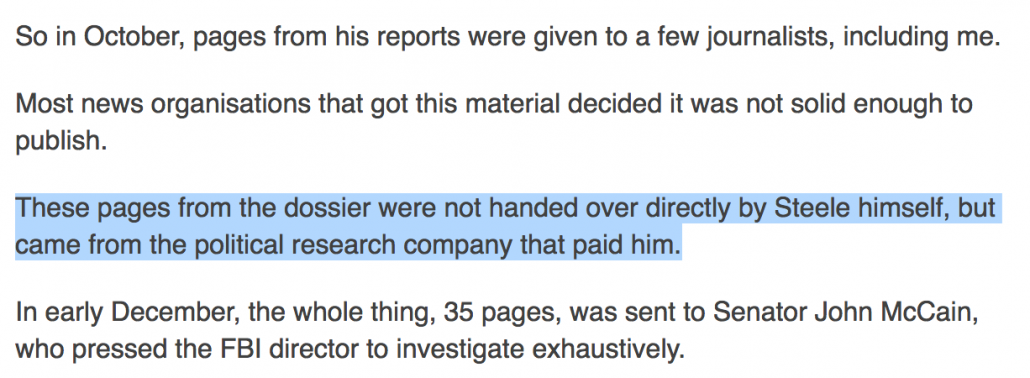
Sometime between the original publication and 14:06 GMT, the paragraph claiming the American oppo research company, Fusion, disseminated the document was removed from the story.

Then, by 15:32 GMT — roughly 20 minutes after I did a post noting the first change — that passage was again changed, this time to suggest the pages were shown, but not given, to journalists.

I’ve been told second-hand that actual pages were given, not shown, to at least one journalist, suggesting the middle story may be the accurate one. Moreover, the actual dossier would have had to have been shared for James Clapper’s claim that the dossier “was widely circulated … among the media, members of Congress and Congressional staff ” to be true.
Steele’s free report based off unsolicited intelligence
All that pertains to the dossier, generally, though. It’s actually irrelevant to the lawsuit, since Gubarev is suing over claims made in the last report, dated December 13 (see this post for why that date is important).
Here’s what Steele claims about that last report.
The Defendants continued to receive unsolicited intelligence on the matters covered by the pre-election memoranda after the US Presidential election and the conclusion of the assignment for Fusion.
After receiving some such intelligence [Steele] prepared the confidential December memorandum, … on his own initiative on or around 13 December 2016.
[snip]
Accordingly, [Steele] provided a copy of the December memorandum to:
a. A senior UK government national security official acting in his official capacity, on a confidential basis in hard copy form; and
b. Fusion, by enciphered email with an instruction to Fusion to provide a hard copy to Sen. McCain via Mr Kramer.
Nowhere in this defense does Steele specify when he gave McCain the dossier, aside from sometime after November 28. Presumably it was on or before December 9, when McCain reportedly handed the dossier over to the FBI (though McCain was a bit sketchier about when he got and handed on the dossier and — very significantly — doesn’t describe doing so twice).
Steele does confirm he also shared the dossier with “a senior UK government national security official,” which is another way the US intelligence community might have gotten the dossier they shared with Trump before BuzzFeed leaked it, contrary to their utterly ridiculous claims to have been the last to know of it.
In any case, the timeline suggests that, after sources started leaking aggressively about Putin affirmatively trying to elect Trump on December 9 (even as Obama called for a review of the intelligence), Steele all of a sudden got new intelligence (or, less plausibly, decided to write down the intelligence he had before he sent McCain the dossier but hadn’t written up).
Multiple reports have said that Steele was working for free in that period. Apparently, too, the sources that Steele had been paying up to this point decided they would provide unsolicited intelligence.
Did they get paid, either?
The virgin birth of the most inflammatory claims
And this is all very interesting because — as I have noted before — this last brief includes three far more inflammatory claims than Steele had ever provided before.
First, as part of the claims Gubarev is suing over, Steele claimed he had been told that in addition to using botnets to “transmit viruses, plant bugs, and steal data,” (which sounds nothing like what allegedly actually happened in the hack), XBT also conducted “altering operations,” a suggestion that Russia was tampering with data rather than just stealing it.
Second, whereas earlier reporting on Michael Cohen’s role had been more vague, this report described him discussing “deniable cash payments to the hackers who had worked in Europe under Kremlin direction against the CLINTON campaign.” That is, the dossier made far stronger claims that Trump’s team had discussed the hack itself, rather than making quid pro quo deals to alter US policy.
Finally, and most importantly, Steele’s “unsolicited” intelligence claimed that Trump had paid the hackers.
On payments, IVANOV’s associate said that the operatives involved had been paid by both TRUMP’s team and the Kremlin, though their orders and ultimate loyalty lay with IVANOV.
This is the report that wraps up all the allegations in a neat little bow, setting up the impeachment of Trump, and it came unsolicited after the spooks were upping the pressure on McCain.
Right wing outlets are (rightly) making much of the fact that Steele claimed the intelligence “needed to be analysed and further investigated/verified.” But I’m just as struck by the rather neat claim that by far the most inflammatory intelligence in the dossier came in the days after Democrats and the IC started ratcheting up pressure on Trump, and that it came unsolicited.
Update: This post has been updated for clarity.
Update: David Corn’s account of interacting with Steele is inconsistent on the point of whether he got the dossier. At first he says he was able to “review” the memos.
I also was able to review the memos the former spy had written, and I quoted a few key portions in my article.
But by the end of the paragraph, he says the reason he didn’t publish the dossier is not because he didn’t have it, but because it would have revealed some of Steele’s sources (as it eventually did).
I also didn’t post the memos, as BuzzFeed did this week, because the documents contained information about the former spy’s sources that could place these people at risk.
And technically, Corn’s description of how Steele directed him to treat the information is not “off the record” (though I can still remember the moment during the Scooter Libby trial when, after one after another top journalist provided a different definition of the term on the stand, journalists in the media room — Corn was there — acknowledged that everyone has a different definition of the term). In his article, Corn says he was simply told not to ID Steele’s nationality or MI6 but suggests he was permitted to quote the dossier, which he did.
For my story in October, I spoke with the former spy who wrote these memos, under the condition that I not name him or reveal his nationality or the spy service where he had worked for nearly two decades, mostly on Russian matters.
Update: It’s worth comparing Steele’s claims with those made in this Vanity Fair feature on the dossier. Of particular note, VF makes no mention of Wood being an associate of Steele’s firm, and instead suggests he may have been sent to the conference in question to contact McCain.
It was at some point in this busy weekend that Senator John McCain and David J. Kramer, a former State Department official whose bailiwick was Russia and who now toils at Arizona State University’s Washington-based McCain Institute for International Leadership, found themselves huddling with Sir Andrew Wood, a former British ambassador to Russia.
Sir Andrew, 77, had served in Moscow for five years starting in 1995, a no-holds-barred time when Putin was aggressively consolidating power. And in London Station, the M.I.6 puppeteer pulling all the clandestine strings was Christopher Steele. Sir Andrew knew Steele well and liked what he knew. And the former diplomat, who always had a few tough words to say about Putin, had heard the rumors about Steele’s memo.
Had Sir Andrew arrived in Halifax on his own covert mission? Was it just an accident that his conversation with Senator McCain happened to meander its way to the findings in Steele’s memos? Or are there no accidents in international intrigue? Sir Andrew offered no comment to Vanity Fair. He did, however, tell the Independent newspaper, “The issue of Donald Trump and Russia was very much in the news and it was natural to talk about it.
Note, this account would put Kramer in Surrey meeting Steele around December 5, which would mean Steele’s most inflammatory intelligence came in (“unsolicited,” he claimed) during a period of 11 days. It also says that Kramer brought the dossier back with him, undermining Steele’s claims that Fusion had been in the loop. VF also suggests there may have been more to the dossier Steele handed Kramer; Steele goes so far out of his way in his defense to claim he did no reports in November that I suspect he did report in November (perhaps directly for FBI?).

![[Photo: National Security Agency, Ft. Meade, MD via Wikimedia]](https://www.emptywheel.net/wp-content/uploads/2017/08/NationalSecurityAgency_HQ-FortMeadeMD_Wikimedia.jpg)

